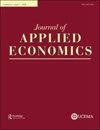货币紧缩时期的企业社会责任与贸易信用
IF 1.4
4区 经济学
Q3 ECONOMICS
引用次数: 0
摘要
摘要本文研究了在货币紧缩冲击下,企业的企业社会责任(CSR)是否会影响其获得贸易信贷的机会。基于1995年第一季度至2014年第一季度的美国企业层面数据,我们发现在货币紧缩冲击后,企业社会责任水平较高的企业比企业社会责任程度较低的企业获得更多的贸易信贷。此外,企业社会责任对社会信任度较高地区和竞争更激烈行业的企业的有益影响更大。对观察到的现象的解释是,高企业社会责任企业被认为更值得信赖。本文章由计算机程序翻译,如有差异,请以英文原文为准。
Corporate social responsibility and trade credit during periods of monetary contraction
ABSTRACT This paper studies whether firms’ corporate social responsibility (CSR) affects their access to trade credit in response to monetary contraction shocks. Based on US firm-level data from 1995Q1 to 2014Q1, we find that after monetary contraction shocks, firms with higher levels of CSR receive more trade credit than firms with lower levels of CSR. Moreover, the beneficial impact of CSR is stronger for firms in regions with higher social trust and in more competitive industries. The interpretation of the observed phenomena is that the high-CSR firms are regarded as more trustworthy.
求助全文
通过发布文献求助,成功后即可免费获取论文全文。
去求助
来源期刊

Journal of Applied Economics
ECONOMICS-
CiteScore
3.00
自引率
0.00%
发文量
57
审稿时长
40 weeks
期刊介绍:
The Journal of Applied Economics publishes papers which make a significant and original contribution to applied issues in micro and macroeconomics. The primary criteria for selecting papers are quality and importance for the field. Papers based on a meaningful and well-motivated research problem that make a concrete contribution to empirical economics or applied theory, in any of its fields, are especially encouraged. The wide variety of topics that are covered in the Journal of Applied Economics include: -Industrial Organization -International Economics -Labour Economics -Finance -Money and Banking -Growth -Public Finance -Political Economy -Law and Economics -Environmental Economics
 求助内容:
求助内容: 应助结果提醒方式:
应助结果提醒方式:


